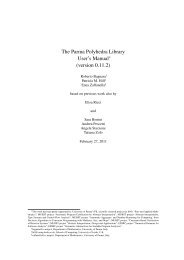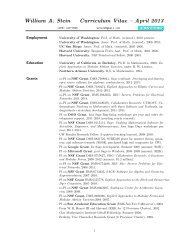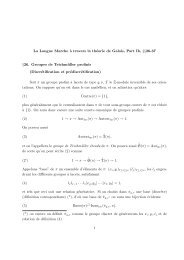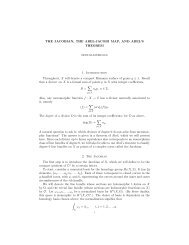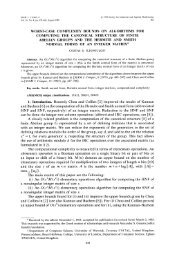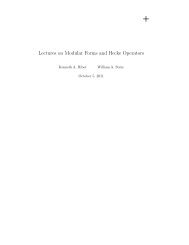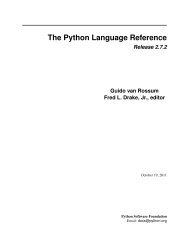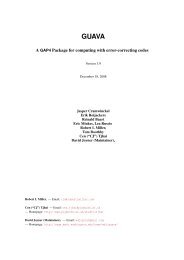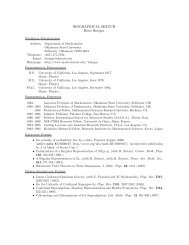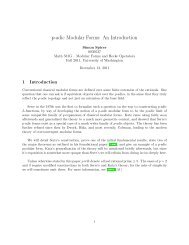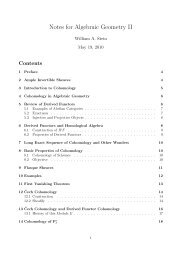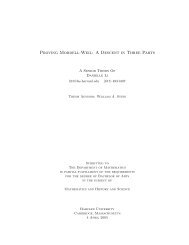Efficient implementation of the Hardy-Ramanujan ... - William Stein
Efficient implementation of the Hardy-Ramanujan ... - William Stein
Efficient implementation of the Hardy-Ramanujan ... - William Stein
You also want an ePaper? Increase the reach of your titles
YUMPU automatically turns print PDFs into web optimized ePapers that Google loves.
Page 4 <strong>of</strong> 19<br />
FREDRIK JOHANSSON<br />
Algorithm 1 Simple algorithm for evaluating A k (n)<br />
Input: Integers k,n ≥ 0<br />
Output: s = A k (n), where A k (n) is defined as in (1.6)<br />
if k ≤ 1 <strong>the</strong>n<br />
return k<br />
else if k = 2 <strong>the</strong>n<br />
return (−1) n<br />
end if<br />
(s,r,m) ← (0,2,(n mod k))<br />
for 0 ≤ l < 2k do<br />
if m = 0 <strong>the</strong>n<br />
s ← s+(−1) l cos(π(6l+1)/(6k))<br />
end if<br />
m ← m+r<br />
if m ≥ k <strong>the</strong>n m ← m−k {m ← m mod k}<br />
r ← r+3<br />
if r ≥ k <strong>the</strong>n r ← r−k {r ← r mod k}<br />
end for<br />
return s<br />
First consider <strong>the</strong> case when k is a power <strong>of</strong> a prime. Clearly A 1 (n) = 1 and A 2 (n) = (−1) n .<br />
O<strong>the</strong>rwise let k = p λ and v = 1−24n. Then, using <strong>the</strong> notation (a|m) for Jacobi symbols to<br />
avoid confusion with fractions, we have<br />
⎧<br />
⎪⎨ (−1) λ (−1|m 2 )k 1/2 sin(4πm 2 /8k) if p = 2<br />
A k (n) = 2(−1)<br />
⎪⎩<br />
λ+1 (m 3 |3)(k/3) 1/2 sin(4πm 3 /3k) if p = 3 (2.2)<br />
2(3|k)k 1/2 cos(4πm p /k) if p > 3<br />
where m 2 , m 3 and m p respectively are any solutions <strong>of</strong><br />
(3m 2 ) 2 ≡ v mod 8k (2.3)<br />
(8m 3 ) 2 ≡ v mod 3k (2.4)<br />
(24m p ) 2 ≡ v mod k (2.5)<br />
provided, when p > 3, that such an m p exists and that gcd(v,k) = 1. If, on <strong>the</strong> o<strong>the</strong>r hand,<br />
p > 3 and ei<strong>the</strong>r <strong>of</strong> <strong>the</strong>se two conditions do not hold, we have<br />
⎧<br />
⎪⎨ 0 if v is not a quadratic residue modulo k<br />
A k (n) = (3|k)k<br />
⎪⎩<br />
1/2 if v ≡ 0 mod p,λ = 0<br />
(2.6)<br />
0 if v ≡ 0 mod p,λ > 1.<br />
If k is not a prime power, assume that k = k 1 k 2 where gcd(k 1 ,k 2 ) = 1. Then we can factor<br />
A k (n) as A k (n) = A k1 (n 1 )A k2 (n 2 ), where n 1 ,n 2 are any solutions <strong>of</strong> <strong>the</strong> following equations.<br />
If k 1 = 2, <strong>the</strong>n<br />
{<br />
32n 2 ≡ 8n+1 mod k 2<br />
n 1 ≡ n−(k2 2 −1)/8 mod 2, (2.7)<br />
if k 1 = 4, <strong>the</strong>n<br />
{<br />
128n 2 ≡ 8n+5 mod k 2<br />
k 2 2 n 1 ≡ n−2−(k 2 2 −1)/8 mod 4, (2.8)



